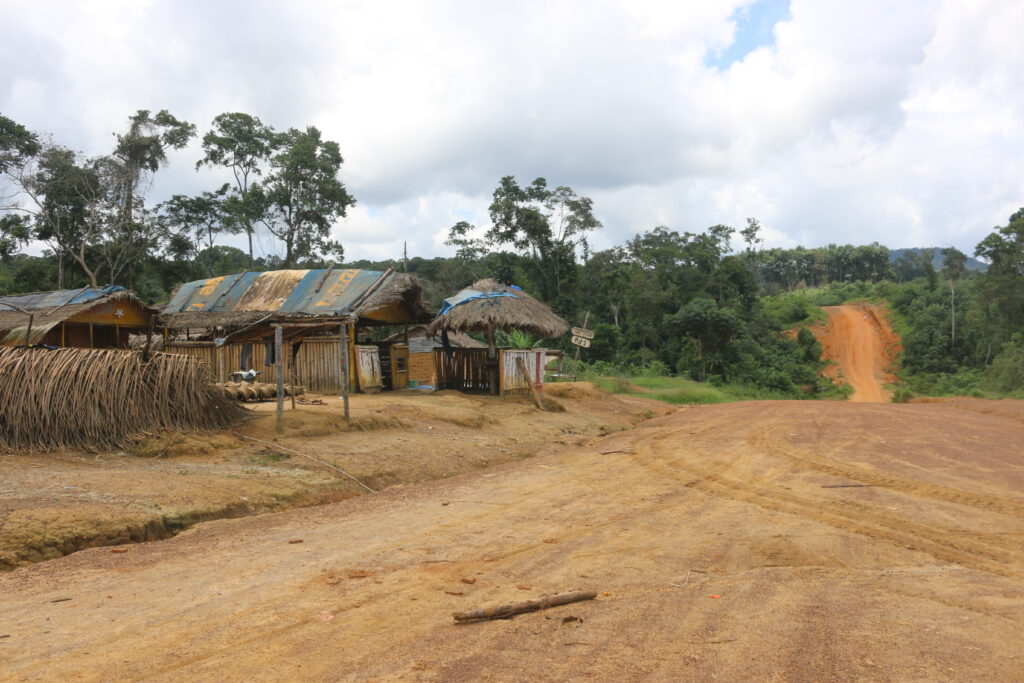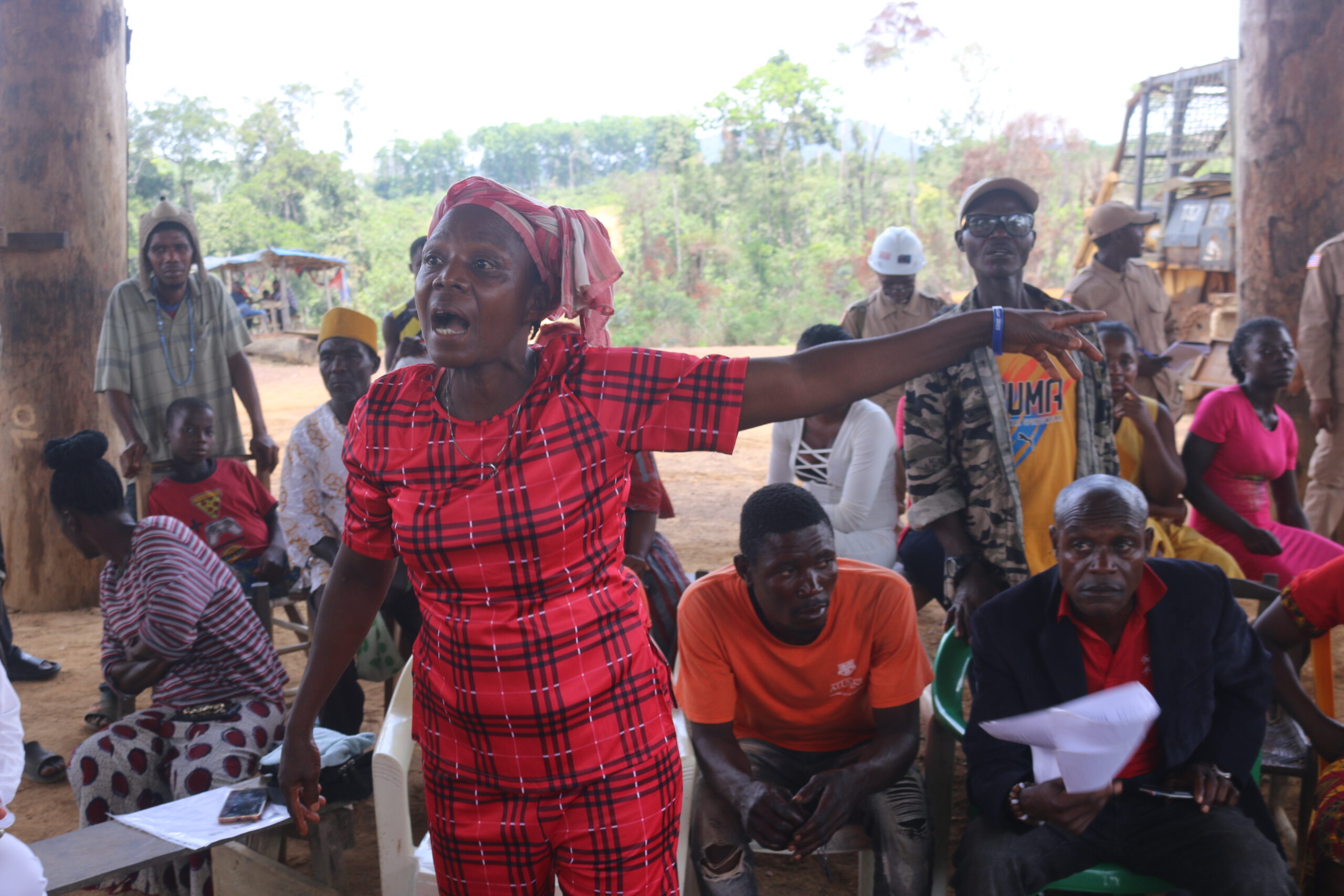Top: Dugbormar Kwekeh, a member of Gheegbarn #1 Community Forest tells European envoys about challenges with commercial logging in that part of Liberia in a March meeting. The DayLight/James Harding Giahyue
By Emmanuel Sherman
JIMMY DIGGS TOWN – A logging contract between a community forest and a Chinese-owned company in Compound Number Two, Grand Bassa County is perhaps forestry’s most troublesome agreement today.
But women on the leadership of Gheegbarn #1 Community Forest, which has a contract with West African Forest Development Incorporated (WAFDI), desire to continue their roles as elections draw near.
“We will be willing to work again if elected because we want to develop our place,” says Dugbormai kwekeh a member of Gheegbarn’s community assembly (CA). She and other women spoke in the Bassa language through an interpreter.
“We want our children to go to school, we don’t want them to be like us,” Kwekeh added.
Elections for a new corps of officers for the community’s forestry leadership are slated later this year.
Every five years, a forest community elects new members to its community assembly, which represents towns and villages that own the forest. Members of the new assembly then elect officers of its executive committee, the highest decision-making body in community forest governance. The assembly also elects members of the community forest management body (CFMB), which runs the affairs of the community forest. The CFMB tenure ranges from two to five years. The Community Rights Law of 2009 with Respect to Forest Lands requires at least a slot for a woman on the CFMB.
Oretha Toway, a member of the CFMB hopes to serve another term. “If appointed again, I will help the new leadership to build the community,” says Toway. “We don’t have any school, hospital.”
Illegal Logging
Gheegbarn’s trouble began from the very beginning in 2018. The FDA illegally approved the community’s Forest agreement with WAFDI with a lifespan of seven years, not 15 as required by law.
After that, the FDA authorized WAFDI harvest of more than three times the size of the forest as the law mandates. It took over three years for the Ministry of Justice to discover the scandal in an investigation.
The ministry later reprimanded FDA, SGS, the firm that created Liberia’s timber-tracking system, and WAFDI for breaking forestry laws and regulations.
The scandal tore off the roof of the FDA and the towns and villages of Gheegbarn. Logging activities in Gheegbarn were halted for nearly a year. FDA board of directors asked President George Weah to dismiss several senior managers of the agency. That did not happen but a major reshuffle took place. Gheegbarn and WAFDI have retroactively signed a new contract for 15 years.
The women-member of Gheegbarn are aware of the impacts of the scandal on the community, including the over-exploitation of the forest in the last three years. (WAFDI exported 29,104 cubic meters of round logs during that time, according to the Liberia Extractive Industries Transparency Initiative, citing FDA figures). However, it motivates them more.

“I will agree to serve as a member of the assembly, provided there will still be logs in the forest,” says Etta Diggs an assembly member.
The women want to cancel the agreement with WAFDI because it has not lived up to the agreement.
By now, WAFDI should have constructed two schools, connected four farm-to-market roads, and 10 handpumps by now and employed 60 percent of its workforce from Gheegbarn.
“We don’t want the company anymore. They brought poverty on us,” Kwekeh adds. She had made the same point when EU ambassadors visited the community back in March. Kwekeh’s comments are backed by the law, as villagers can choose to cancel contracts with companies.
But amid the rigmarole with WAFDI, Gheegbarn also has an internal wrangle, which the women also want to address. The executive committee chair Robert Zeogar and the secretary to the CFMB Larry Tuning are at loggerheads with the chief officer of the CFMB Junior Wesseh, according to Wesseh and the women. Efforts to speak to Tuning and Zeogar on the issue did not materialize. Both men were not present during this reporter’s two-day stay in the area and their phones were off.
Wesseh, Zeogar and Tuning are signatories to the account, contrary to the community rights regulation. The regulation mandates the chief officer, the treasurer another authorized community member approved by the assembly.
“The EC chair [Zeogar] and CFMB secretary [Tuning] have been making unauthorized withdrawals with alerts coming to the CFMB chief officer [Wesseh],” says Jonathan Yiah. Yiah’s NGO, the Sustainable Development Institute (SDI), works with Gheegbarn’s leadership.
Markoni Geezee, a member of the assembly would only serve another term given that Tuning and Zeogar are replaced. She accuses the duo of enriching themselves at the expense of the community.
“We walked till our slippers cut along the way for the company to come but now we are the losers,” says Geezee. “You only have a few people getting rich from the forest.”

Funding for this story was provided by the Foundation for Community Initiatives (FCI). The DayLight maintained complete editorial independence over its content.




